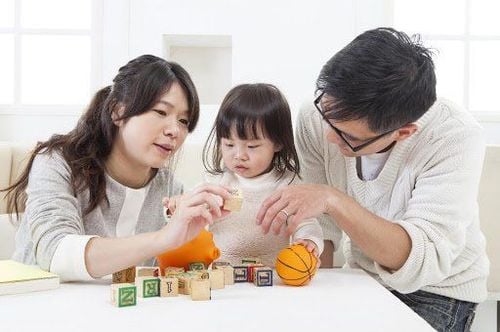This is an automatically translated article.
Gaye Grunlond, educational consultant and author of the book Developmentally Appropriate Play: Guiding Young Children to a Higher Level says children learn best through play. However, that doesn't mean you need to buy expensive or big toys. There are many games and simple activities that help develop children's brains at no cost.
1. Factors affecting children's brain development
The first years of life are very important for a child's health and later development. One of the main reasons is rapid brain development that begins before birth and continues into childhood. Although the brain continues to develop and change as an adult, the first 8 years can build the foundation for a person's future academic, health, and life success.
How well the brain develops depends on many factors, including:
Genetics inherited from parents Proper nutrition during pregnancy Exposure to toxins or infections A child's experience with others and the world Nurturing and taking good care of both body and mind is key to supporting healthy brain development. Positive or negative experiences can add up to shape a child's development and can have lifelong effects.
In order to nourish children physically and mentally, parents and caregivers need to prepare themselves with the necessary knowledge and equipment. Proper care for children, starting before birth and continuing throughout childhood, ensures that a child's brain develops well and reaches its full potential.

Dinh dưỡng hợp lý khi mang thai có thể ảnh hưởng đến sự phát triển trí não của trẻ
2. Importance of childhood experiences for brain development
Children are born ready to learn, and have many skills to learn over the years. What children learn will depend on their parents, family members and caregivers as their child's first teachers to develop the right skills, so that the child can become independent and lead a healthy life. healthy and successful in the future.
Brain development is strongly influenced by a child's experiences with other people and the world around them. Nurturing the mind is important for brain development. Children develop and learn best in a safe environment where they are protected from negative factors.
Parents and other family members can support a child's healthy brain development by talking, playing with, and caring for the child. Children learn best when parents take turns talking and playing with them, and building on children's skills and interests.
Nurturing a child by understanding their needs and responding appropriately helps protect their brains from stress. Talking to children and letting them listen to books, stories, and songs strengthens their language and communication, helping them do well in school and achieve more.
Exposure to stress and trauma can have long-term negative consequences for a child's brain, while talking, reading and playing can stimulate brain development. Ensure that parents, loved ones, and preschool teachers have the resources and skills to provide safe, stable, nurturing, and developmental care for children.
3. A good start for your child's brain
In order to learn and develop properly, a child's brain must be healthy and protected from disease and other risks. Promoting the development of a healthy brain can begin even before pregnancy.
Such a healthy diet and adequate supply of appropriate nutrients such as enough folic acid will promote a healthy pregnancy and a healthy fetal nervous system. Vaccinations can protect pregnant women from infections that can damage the brain of their unborn baby.
During pregnancy, the fetal brain can be affected by many risk factors such as:
Infectious diseases such as Cytomegalovirus or Zika virus. Exposure to toxins, including tobacco and alcohol. Mental health of the mother: When a pregnant woman experiences stress, trauma or mental health conditions such as depression, it will adversely affect the brain development of the child. Regular health care during pregnancy can help prevent complications, including premature birth, which can affect your baby's brain. Newborn screening can detect potentially dangerous conditions for a baby's brain, like phenylketonuria (PKU).
Healthy brain development in infants continues to depend on proper care and nutrition. Because children's brains are still developing, they are especially vulnerable to head trauma, infections, or toxins, such as lead.

Trẻ cần có một chế độ dinh dưỡng phù hợp
Vaccines given to young children, such as measles vaccine, can protect children from dangerous complications such as encephalitis. Parents should help children have access to clean food and healthy and safe living and playing places for children can help their development much better.
4. 6 good games for young minds
4.1. Block games The block game is possibly the oldest toy in the world. They help children develop the ability to experiment, form hypotheses (like “What if I put this big block on top of this small block?”), test the hypothesis to be true, and form a new hypothesis
Grunlond, educational consultant and author of the book Developmentally Appropriate Play: Guiding Young Children to a Higher Level says: “This kind of experimentation is the basis for scientific thinking.
Psychologist Kathy Hirsh-Pasek, co-author of Flashcards Never Used Einstein, says: "Block games help children learn words like up, down, up, down, in and out".
Parents can challenge their kids with everything with blocks of various shapes, weights and colors, and see what their kids will do with these blocks.
4.2 Sand and water A bucket of water, a basin of sand, and a few cups and spoons can keep a child mesmerized for hours.It also helps children who are learning about volume. and textures, liquids and solids.
Plus, it's an engaging game, so kids will develop perseverance as they deal calmly with the fact that the water they pour into their carefully dug hole keeps disappearing. . While the child is playing, you can occasionally ask an open-ended question to get the child involved.
4.3. Do It Your Child's Way If the child wants to drag a leaf through a puddle, that's okay. If your child wants to dig a hole with a stick, don't stop him. And you can do this with your kids in the park, the playground, or even your backyard. Research shows that children learn more words when we follow them than when they follow us. Plus, all this focused attention means your child is spending time with you and learning about the world around her on her own.

Cha mẹ cũng nên lựa chọn một số trò chơi tốt cho trí não trẻ
4.4. Dress Up Dress up games help children develop imagination, creative thinking and even impulse control, which is important as children get older. Grunlond explains: “When kids put on a costume, they come out on their own. This forces the child to show better self-regulation."
Parents should encourage children to try on the clothes you have set aside for them to wear on the next play day and watch their imaginations.
4.5. Cooking game Give your child an empty pot and a wooden spoon, and let them "cook the food." They know it's just pretend, this isn't just for fun. but also help children develop pre-literate skills
If your child demands "real" food, but you are not ready to deal with a big mess, try using other substitutes for food. For example, a sponge can be used as a sandwich,... Caution: avoid small objects, such as beans, which can pose a choking hazard to young children.
4.6 Hide-and-seek This age-old game is perhaps the most enjoyable way to develop navigation, mapping, and spatial skills.In searching, children must visualize the layout of the playground (or your house), form a fake Learn about the different places the hider can go, figure out how to get there, then create a new map regarding the child's new location and reorient.
A toddler also perfectly grasps this idea, try hiding an object and see how he finds it. Place a soft drink or stuffed animal under the pillow as your child watches, then ask him or her to find it. Children will be proud and surprised to find them and through it they will learn about location and predictability. To help children develop intellectually, in addition to the nutritional diet, parents should supplement their children with supportive products containing lysine, essential micro-minerals and vitamins such as zinc, chromium, selenium, and B vitamins to help meet the needs of children. meet the nutritional needs of children. At the same time, these essential vitamins also support digestion, enhance nutrient absorption, help improve anorexia, help children eat well, and develop comprehensively.
Please regularly visit Vinmec.com website and update useful information to take care of your baby and family.
Articles refer to sources: babycenter.com, cdc.gov













